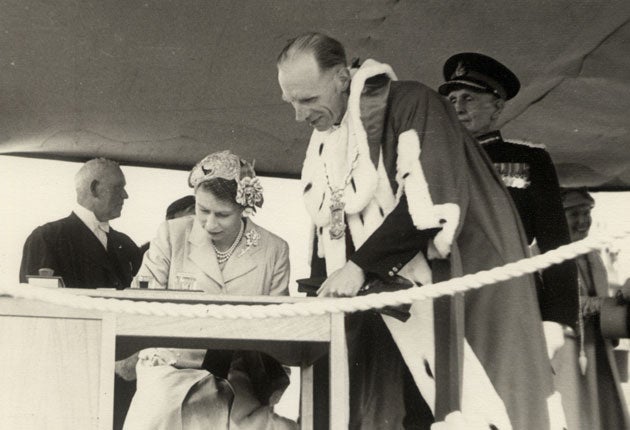William Ferrier: Steelworker and trade unionist who served Labour in Scotland for decades

For 48 years, William Ferrier worked in the same foundry – the Atlas in Armadale, West Lothian. The Atlas was a rather special steel foundry. It produced much of the heavy armour for the fleet at the Battle of Jutland, and was a vital producer of steel and specialist iron for the navy and tanks in World War Two. Its kilns were the biggest in Britain and Ferrier was the influential leader of a loyal workforce over four decades.
A very political person, bitterly opposed to fascism, a fervent admirer of Mahatma Gandhi, he was disappointed to be rejected by the navy on the grounds that he must remain in his reserved occupation as a steel moulder. He became, in lieu, a most active member of the home guard.
For many years, Ferrier was the right-hand man in Scotland of Willie (later Sir William) Simpson, who had gone from being secretary of the foundry workers in Scotland to the general secretariatship of the British amalgamated union of foundry workers based in Manchester. Simpson was contemporaneously immersed in the national affairs of the Labour Party, culminating in the party chairmanship at the critical national conference of 1973, which laid the basis of Harold Wilson's unexpected victory in the general election of February 1974.
William Ferrier was born into a steel family who lost many members during the First World War. It was this, perhaps, that engendered his deep passion on political issues of peace and war. He was educated at Armadale Primary School, where there was a particularly fierce old-fashioned Scottish dominie to whom Ferrier was retrospectively grateful, and Armadale Junior Secondary School. Becoming an apprentice at the Atlas steel factory, he was to remain there for nearly half a century.
In 1962 John Taylor, then Labour Deputy Chief Whip, unexpectedly died after a visit to Tanganyika, as Tanzania then was. There was a vacancy in the West Lothian constituency. On account of his high personal standing and support throughout the trade union movement, where the foundrymen and the miners were on good terms with each other, Ferrier might well have romped home. As it was he came fifth during a selection conference in which I squeezed in as Labour's candidate.
The reason for Ferrier's vote – fifth out of sixth, and second out of the contest – was very unfair. Ferrier had been Provost of Armadale in the mid-1950s and as a councillor was associated with Armadale Town Council. However, in 1961, unknown to him, the Provost and the chief executive had authorised the sale of the town piano for a crate of whisky. This was heaven's gift to the Scottish press. Delegates of the selection conference simply shook their heads and said that if they had Willie Ferrier as a candidate the whole of Scotland would be laughing at them.
It is a testimony to Ferrier's loyalty to the Labour Party that during the subsequent by-election no unsuccessful candidate at the selection conference could have given me more support – and one of my memories of him in the 1974 elections was how he would take two buses in order to get to a meeting to speak for me, spluttering with cold when I drove him home at the end of the night. He was the most generous of men.
In his work in the trade union, on the health clause and on the regional council, he campaigned tirelessly to help the victims of silicosis, the particular disease which afflicted pattern makers and steel moulders, combined with the threat of emphysema, pneumoconiosis and chronic bronchitis.
Ferrier was a talented cornet player and promoted musical education throughout his public life. He would take his daughter Muriel to cornet practice twice a week, and with the help of Willie Simpson, who found her digs in Manchester, encouraged her successful musical education.
Tam Dalyell
William Ferrier, steel foundryman, trade union official and politician: born Armadale, West Lothian 4 June 1913; Atlas steel foundry 1930-78, Provost of Armadale 1954-1956; married Jane McLean (died 1999; one daughter); died Aberdeen 11 December 2009.
Subscribe to Independent Premium to bookmark this article
Want to bookmark your favourite articles and stories to read or reference later? Start your Independent Premium subscription today.

Join our commenting forum
Join thought-provoking conversations, follow other Independent readers and see their replies